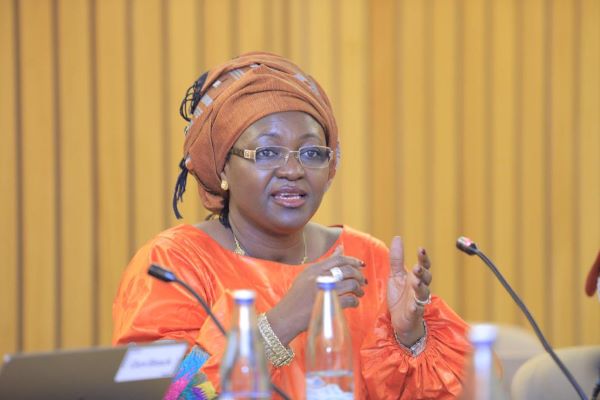
CEO of the Ghana Interbank Payments and Settlements Systems (GhIPSS), Archie Hesse has said that real-time payments now constitute over 65% of transactions on the GhIPSS platform, highlighting the importance of FinTechs in Ghana.
“About eight years ago when we started, majority of our transactions were in the clearinghouse, followed by cards and real-time transactions came in third. But now over 65% of transactions in real-time,” he told Techfocus24 in an interview at Addis Ababa, on the sidelines of the launch of the State of Inclusive Instant Payment Systems (SIIPS) in Africa Report, put together by AfricaNenda.
This, according to him, indicates that digital financial transactions in Ghana is fast shifting towards real-time payments, as the service is now being used widely by both the banked and unbanked Ghanaians, as well as businesses across the country.
He noted that individuals who used to rely solely on banking services are reducing significantly and moving towards the real-time transactions, such as GIP (GhIPSS Instant Pay), Mobile Money Interoperability (MMI) and others on the GhIPSS platform.
Archie Hesse said the trend also indicates that the GhIPSS’ foresight to build real-time rails in Ghana was a good one and it is paying off, adding, however, that “what is left now is to find a lot of use cases and encourage the FinTechs to innovate and provide more services to individuals, businesses and government.”
Fintech dominate GhIPSS
Speaking of FinTechs, he noted that banks used to be GhIPSS’ main partners when it first started, but with the boom in real-time transactions, the FinTechs have taken over, so it has now become imperative for GhIPSS to find ways to forge even closer relationship with the FinTechs to grow the ecosystem even further.
Indeed, GhIPSS was originally built to facilitate easy and seamless transactions between commercial banks in the country, with regards to clearing of cheques and card settlements. So, banks were the only partners of GhIPSS for several years.
Now due to the boom in digital finance, particularly real-time payments, GhIPSS has built a number of real-time payment rails, which have now become the main stay of the platform, putting FinTechs at the centre of the payments conversation.
Data Driven Policies
Archie Hesse also noted that one of the ways GhIPSS is driving adoption of real-time payments among citizens is by focusing on affordability by using data to determine ways the banks and other connecting institutions can bear some of the cost and make the service affordable for customers.
“Through the use of data we were able to determine that since banks keep the cash float on the real-time payments platforms, they can invest and make profits on those floats, so any fees related to centre only will be borne by the banks and other connecting institutions to make the service affordable to the users,” he said.
The centre only fee refers to the 10Gp GhIPSS charges the connecting institutions (banks and electronic money issuers) for every transaction. Based on data, the industry players have agreed to pay the fee to GhIPSS without transferring it to consumers.
The centre only fees is completely independent of the usual 1% transfers fees charged by banks and EMIs for transfers on the interoperability platform.
So, in case of GhanaPay, which allows free transfers for all customers to all wallets, the banks still pay GhIPSS 10Gp for every single transfer. And when Vodafone Cash decided to offer free transfer to all wallets for three years, they still paid GhIPSS the 10Gp related to every transfers to wallets on other networks.
Archie Hesse therefore urge stakeholders in the instant payment ecosystem in Africa, like the central banks, payment switches operators and other industry players make data available, so it can be used to formulate appropriate policies to deepen adoption and bridge the usage gap.

Speaking of the importance of FinTech to the inclusive instant payments ecosystem, Deputy Chief Executive of AfricaNenda, Sabine Mensah, at the launch of the SIIPS Report, indicated that it is time to give FinTechs equal access at the negotiation table because they have the skills and the innovations needed to create more use cases to boost inclusive instant payment across Africa.
Per the report, even though there are 32 instant payment platforms in Africa processing over 32 billion transactions, worth more than US$1.2 trillion in 2022, there are still some 400 million Africans who are completely uncovered due to a number of factors, including affordability, lack of connectivity, lack of appropriate devices, lack of digital skills and lack of trust in the platforms.
Sabine Mensah said over 60% of the 400 million being left behind are women and that is a worrying trend because the whole idea of financial inclusion is to carry along the unserved and underserved populations, who are mainly women, but it appears even more women are still being left behind.
She is however confidents that as stakeholders worked towards addressing the key issues of concern to consumers, and regulators also made data available to tell a more accurate story about the state of inclusive instant payments in Africa, and also harmonize regulations across borders, the continent will be on its way to leapfrogging the hurdles in the way of instant payments as a tool for bridging the development gap, particularly within the context of the AfCFTA.









